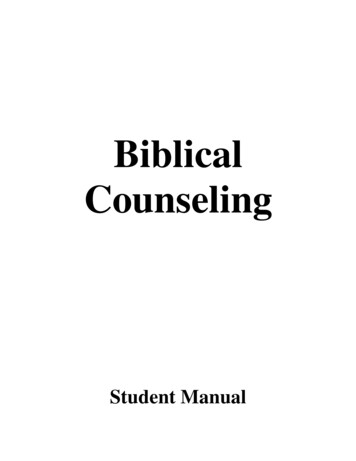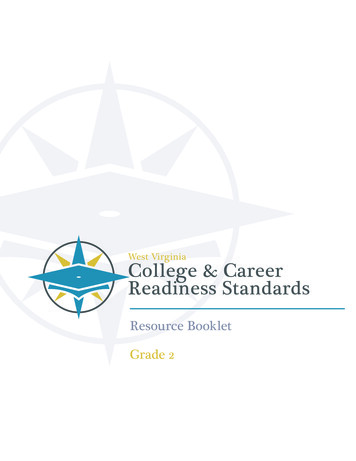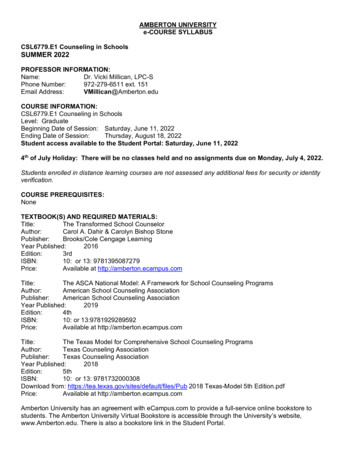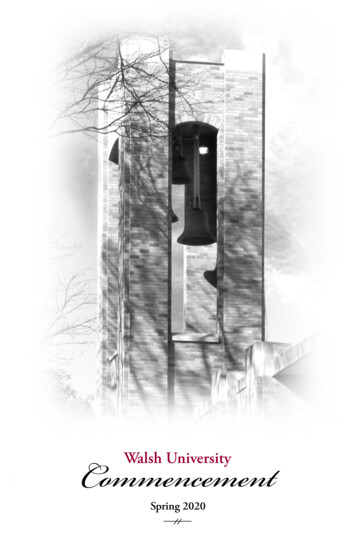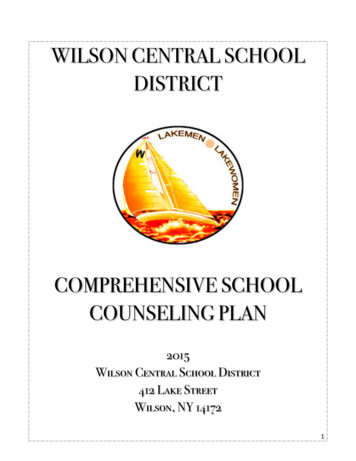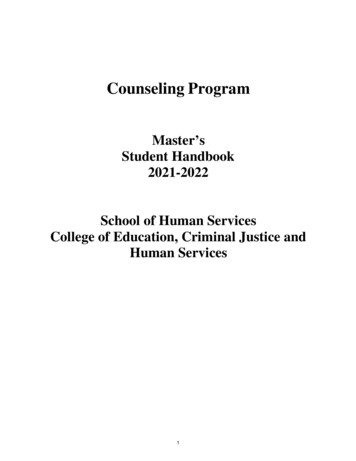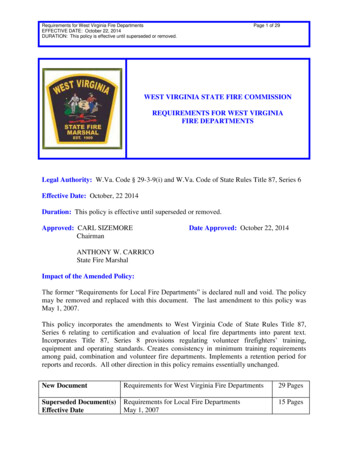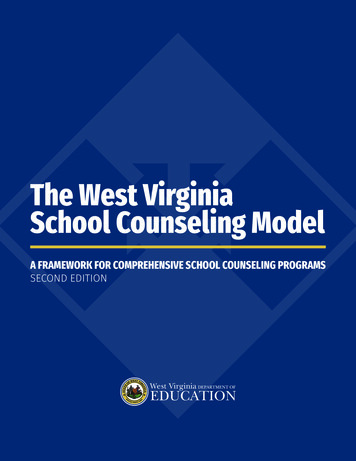
Transcription
The West VirginiaSchool Counseling ModelA FRAMEWORK FOR COMPREHENSIVE SCHOOL COUNSELING PROGRAMSSECOND EDITION
West Virginia Board of Education2021-2022Miller L. Hall, PresidentThomas W. Campbell, CPA, Vice PresidentF. Scott Rotruck, Financial OfficerRobert W. Dunlevy, MemberL. Paul Hardesty, MemberDaniel D. Snavely, M.D., MemberDebra K. Sullivan, MemberNancy J. White, MemberJames S. Wilson, D.D.S., MemberSarah Armstrong Tucker, Ph.D., Ex OfficioChancellorWest Virginia Higher Education Policy CommissionWest Virginia Council for Community and Technical College EducationW. Clayton Burch, Ex OfficioState Superintendent of SchoolsWest Virginia Department of Education
The West Virginia School Counseling ModelA Framework for Comprehensive School Counseling ProgramsSECOND EDITIONReprinted in part, with permission, from the ASCA National Model: A Framework for School Counseling Programs, fourth edition,published by the American School Counselor Association.
Table of ContentsForeword . . . . . . . . . . . . . . . . . . . . . . . . . . . . . . . . . . . . . . . . . . . . . . . . . . . . . ivIntroduction . . . . . . . . . . . . . . . . . . . . . . . . . . . . . . . . . . . . . . . . . . . . . . . . . . . 1West Virginia School Counseling Model and Policy Task Force Members . . . . . . . . . . . . . . 6Section I: Define . . . . . . . . . . . . . . . . . . . . . . . . . . . . . . . . . . . . . . . . . . . . . . . . 8STUDENT STANDARDS . . . . . . . . . . . . . . . . . . . . . . . . . . . . . . . . . . . . . . . . 8West Virginia’s Pre-K Standards for Universal Pre-K . . . . . . . . . . . . . . . . . . . . . 8West Virginia’s College- and Career-Readiness Dispositions and Standards for StudentSuccess (WVCCRDSSS) for Grades K-12 . . . . . . . . . . . . . . . . . . . . . . . . . . . . . 9ASCA Student Standards: Mindsets & Behaviors for Student Success . . . . . . . . . . . 9Professional Standards . . . . . . . . . . . . . . . . . . . . . . . . . . . . . . . . . . . . . . .10West Virginia School Counselor Professional Standards . . . . . . . . . . . . . . . . . .10ASCA School Counselor Professional Standards & Competencies . . . . . . . . . . . . .10ASCA Ethical Standards . . . . . . . . . . . . . . . . . . . . . . . . . . . . . . . . . . . . .10Section II: Manage . . . . . . . . . . . . . . . . . . . . . . . . . . . . . . . . . . . . . . . . . . . . . . 12Comprehensive School Counseling Program (CSCP) Plan . . . . . . . . . . . . . . . . . . . .12School Counseling Program Focus (CSCP Plan, Section 1.) . . . . . . . . . . . . . . . . . . . .13Beliefs . . . . . . . . . . . . . . . . . . . . . . . . . . . . . . . . . . . . . . . . . . . . . . 13Vision Statement (CSCP Plan, Section 1a.) . . . . . . . . . . . . . . . . . . . . . . . . . . 14Mission Statement (CSCP Plan, Section 1b.) . . . . . . . . . . . . . . . . . . . . . . . . . .15ii Back to Table of Contents
Program Planning . . . . . . . . . . . . . . . . . . . . . . . . . . . . . . . . . . . . . . . . . .16Data-Informed School Counseling . . . . . . . . . . . . . . . . . . . . . . . . . . . . . . .16School Data Summary (CSCP Plan, Section 2.) . . . . . . . . . . . . . . . . . . . . . . . . 17Integrated Delivery of the WVCCRDSSS (CSCP Plan, Section 3.) . . . . . . . . . . . . . . .22Classroom and Group Action Plan (CSCP Plan, Section 4.) . . . . . . . . . . . . . . . . . 22Lesson Plans (CSCP Plan, Section 5.) . . . . . . . . . . . . . . . . . . . . . . . . . . . . . 23Annual Student Impact Goal (CSCP Plan, Section 6.) . . . . . . . . . . . . . . . . . . . . 24Personalized Education Plan Process (CSCP Plan, Section 7.) . . . . . . . . . . . . . . . 26Annual Administrative Conference (CSCP Plan, Section 8.) . . . . . . . . . . . . . . . . 26Use-of-Time (CSCP Plan, Section 9.) . . . . . . . . . . . . . . . . . . . . . . . . . . . . . 28Calendars (CSCP Plan, Section 10.) . . . . . . . . . . . . . . . . . . . . . . . . . . . . . . .31School Counseling Program Advisory Council (CSCP Plan, Section 11.) . . . . . . . . . . 32Referral Process (CSCP Plan, Section 12.) . . . . . . . . . . . . . . . . . . . . . . . . . . 35Resource Mapping and Collaboration (CSCP Plan, Section 13.) . . . . . . . . . . . . . . 36School Crisis Response Plan (CSCP Plan, Section 14.) . . . . . . . . . . . . . . . . . . . 36Section III: Deliver . . . . . . . . . . . . . . . . . . . . . . . . . . . . . . . . . . . . . . . . . . . . . . 37Program Delivery in West Virginia Schools . . . . . . . . . . . . . . . . . . . . . . . . . . . . 37West Virginia Tiered System of Support . . . . . . . . . . . . . . . . . . . . . . . . . . . . . 38Tier 1: Universal Supports . . . . . . . . . . . . . . . . . . . . . . . . . . . . . . . . . . . 39Tier 2: Targeted Interventions . . . . . . . . . . . . . . . . . . . . . . . . . . . . . . . . . 40Tier 3: Intensive Interventions . . . . . . . . . . . . . . . . . . . . . . . . . . . . . . . . 40Direct Student Services . . . . . . . . . . . . . . . . . . . . . . . . . . . . . . . . . . . . . . .41Instruction . . . . . . . . . . . . . . . . . . . . . . . . . . . . . . . . . . . . . . . . . . . .41Appraisal, Advisement, and Personalized Student Planning . . . . . . . . . . . . . . . 43Counseling . . . . . . . . . . . . . . . . . . . . . . . . . . . . . . . . . . . . . . . . . . . 44Indirect Student Services . . . . . . . . . . . . . . . . . . . . . . . . . . . . . . . . . . . . . 45Consultation . . . . . . . . . . . . . . . . . . . . . . . . . . . . . . . . . . . . . . . . . . 45Collaboration . . . . . . . . . . . . . . . . . . . . . . . . . . . . . . . . . . . . . . . . . 46Referrals . . . . . . . . . . . . . . . . . . . . . . . . . . . . . . . . . . . . . . . . . . . . .47Section IV: Assess . . . . . . . . . . . . . . . . . . . . . . . . . . . . . . . . . . . . . . . . . . . . . . . 49Program Assessment . . . . . . . . . . . . . . . . . . . . . . . . . . . . . . . . . . . . . . . . 49Annual Results Reports . . . . . . . . . . . . . . . . . . . . . . . . . . . . . . . . . . . . 50Analysis of the Classroom and Small Group Results Report . . . . . . . . . . . . . . . 51Analysis of the Closing-the-Gap Action Plan/Results Reports . . . . . . . . . . . . . . . 53Data Over Time . . . . . . . . . . . . . . . . . . . . . . . . . . . . . . . . . . . . . . . . . 54Reporting Program Results . . . . . . . . . . . . . . . . . . . . . . . . . . . . . . . . . . 55School Counselor Assessment and Appraisal . . . . . . . . . . . . . . . . . . . . . . . . . . 56School Counselor Performance Evaluation . . . . . . . . . . . . . . . . . . . . . . . . . 56West Virginia School Counselor Evaluation Process . . . . . . . . . . . . . . . . . . . . 56Additional Resource - ASCA School Counselor Performance Appraisal . . . . . . . . . . 58Appendices . . . . . . . . . . . . . . . . . . . . . . . . . . . . . . . . . . . . . . . . . . . . . . . . . . 59Glossary . . . . . . . . . . . . . . . . . . . . . . . . . . . . . . . . . . . . . . . . . . . . . . . 60References . . . . . . . . . . . . . . . . . . . . . . . . . . . . . . . . . . . . . . . . . . . . . 66The West Virginia School Counseling Model iii
ForewordTo streamline and align West Virginia’s School Counseling Model with the American SchoolCounseling Association (ASCA) National Model, Fourth Edition, W.Va. Code §18-5-18b, and WVBEPolicy 2315: Comprehensive School Counseling Program (CSCP), the West Virginia Departmentof Education (WVDE) created a stakeholder group to revise the West Virginia School CounselingModel: A Framework for Comprehensive School Counseling Programs, with this Second Edition.The WV School Counseling Model provides consistency to standardize school counselingprograms across the state and provides a framework of components that all schoolcounseling programs should exhibit. Additionally, the model allows for flexibility for schoolcounselors to customize the school counseling program to meet the individual needs oftheir students. This model will assist district and school leaders, school counselors, andother relevant stakeholders in planning and delivering a comprehensive school counselingprogram to support student academic success, college- and career- readiness, and social/emotional well-being.A well-developed comprehensive school counseling program is an essential component of thecounty and school-level strategic plan. It improves each child’s likelihood of social/emotionalwell-being and academic achievement as they progress over time. This model should be usedto design and implement a comprehensive school counseling program plan to meet the needsof all the students you serve.I offer you a sincere thank you for your dedication and commitment as we continue to promotethe well-being and academic achievement of all West Virginia students.Sincerely,W. Clayton BurchWest Virginia Superintendent of Schoolsiv Back to Table of Contents
Introduction”The West Virginia School Counseling Model: A Framework for Comprehensive SchoolCounseling Programs, Second Edition” provides consistency and standardization for schoolcounseling programs across the state. The state model aligns with the ASCA National Modelpromoting best practices, professionalism, and ethical standards. In addition, the modeloutlines the components of an equitable and inclusive comprehensive school counselingprogram that are integral to the school’s mission and created to impact academic success andsocial/emotional well-being for all students.VisionThrough the implementation of an equitable and inclusive comprehensive schoolcounseling program, all West Virginia students acquire the mindsets and behaviorsto reach their fullest potential and successfully manage their lives as healthy,responsible, competent, and productive citizens who respect themselves and others.MissionTo establish policies, a state model, training, and resources that promote bestpractices, professionalism, and ethical standards for West Virginia school counselors.The American School Counseling Association (ASCA) Model is the national standard model forschool counseling programs. West Virginia state code and policy requires school counselorsto align practices and programs with the ASCA national model. The West Virginia SchoolCounseling Model, Second Edition incorporates the updated ASCA national model with WestVirginia specific state requirements and aligns with West Virginia legislative policies, includingthe updated Policy 2315: West Virginia Comprehensive School Counseling Program (CSCP).The West Virginia School Counseling Model 1
The West Virginia Board of Education (WVBE) recognizes the importance of establishing a CSCPin every West Virginia public school to support student academic success, college- and careerreadiness, and social/emotional well-being. The CSCP is an integral part of the total schoolprogram and aligns with the school’s mission. It is a proactive, systemic approach to assiststudents in acquiring attitudes, knowledge, skills, and behaviors necessary to maximize studentsuccess and preparation for a variety of postsecondary options.The CSCP incorporates the West Virginia Tiered System of Supports (WVTSS) to provideuniversal prevention for all students, targeted interventions for at-risk students, and intensiveinterventions for the most at-risk students. The CSCP is standards-based and designed toaddress identified needs developmentally and sequentially within each programmatic level.The CSCP utilizes school and community data to identify student needs related to the CSCPand set annual priorities aligned with the school’s strategic plan. Research has proven thatthe implementation of a CSCP has a positive impact on student development, student success,school climate, and education (ASCA. Empirical Research Studies Supporting the Value ofSchool Counseling, 40a6-4316-ab6c8f3ffd7941c2/Effectiveness.pdf).A Brief History of the School Counseling ProfessionThe school counseling profession is over 100 years old. It has evolved over the years,influenced by various economic, social, and education factors, and guided by the work of manyindividuals.School counseling began as vocational guidance in the early 1900s in response to theIndustrial Revolution. This role was carried out by administrators and teachers with noorganizational structure other than a list of duties. In the 1920s, the responsibilities of schoolcounselors evolved to those of a clinical focus due to the mental hygiene, psychometric, andchild study movements. The school counseling efforts shifted from economic and vocationalissues to psychological issues and focused on personal adjustment.In the 1930s, the creation of a new organizational structure called pupil personnel servicesaccompanied discussions concerning the role and responsibilities of school counselors.Additionally, there was a new focus on school counselor training and selection criteria for theprofession. Within this shift, the concept of guidance services was born.Counseling in schools expanded in the 1940s and 1950s. In the early 1940s, attention focusedon the contributions of school counseling to the war efforts; however, after 1945, focusreturned to developing school counseling practices and improving the counseling servicesprovided in the school setting. With the passage of the Vocational Education Act of 1946and the National Defense Education Act (NDEA) of 1958, attention once again focused onschool counselors’ selection criteria and training. In 1952, the National Association of SchoolCounseling was established as a division of the American Personnel and Guidance Association,giving school counselors a voice in national affairs.2 Back to Table of Contents
EARLY 1900s1920s1930s1940s - 1950sVocational Guidance(position held byadministrators & teachers)Focus on clinical approach(personal adjustment)Guidance services &pupil servicesFocus of contribution to the war efforts1946 - Vocational Education Act1958 - National Defense Education ActThe 1960s and 1970s brought debates concerning the focus of school counseling and whetherit was psychological or educational. Some believed school counseling served as a significantintervention to psychological issues. In contrast, others believed school counseling wasmore educational with a broader scope of interventions, including counseling, information,assessment, placement, and follow-up services. When the NDEA was amended in the 1960s,school counseling at the elementary level became a reality. The focus of counseling at thislevel differed from that at the secondary level.The concept of school counseling services organized into a program approach began to emergein the 1960s and 1970s. In the 1980s, 1990s, and into the 21st century, more focus was placedon the school counseling program’s organization, management, and implementation. Manystates developed school counseling models during this period. The responsibilities of schoolcounselors became a focus during the 1980s and 1990s, with coordinating, counseling, andconsulting emerging as primary duties.19521960s - 1970s1980s - 1990s2000sEstablishment of theAmerican School CounselingAssociationPsychological or Educational?Elementary School CounselingestablishedComprehensive program approachStates began developingSchool Counseling ModelsFocus on coordinating,counseling, consultingData-driven approach2003: ASCA National ModelUpdated in 2005, 2013, 20192nd Decade – focus on accountabilityDuring the 21st century, the purpose of school counseling programs has continued to bedebated nationally. Discussions surround the focus of the school counseling program. Somebelieve the focus should be on academic achievement and career but not social/emotionalor mental health, while others emphasize the importance of addressing mental healthissues. Many have adopted a more holistic approach for school counseling programs thatencompasses all three areas.The development and implementation of school counseling programs in the United Statesgrew in the 2000s, stimulated by the publication of the American School Counselor (ASCA)National Model in 2003. A second edition was published in 2005, followed by a third edition in2013, and the fourth in 2019.Over the years, the title of the profession has evolved. With the evolution of the schoolcounseling model, the title “guidance counselor” no longer encompasses the broad array ofresponsibilities of the profession. In 1990 ASCA issued an official statement calling on thename change of the profession from “guidance counselor” to “school counselor.” A recentstudy determined that using the outdated title “guidance counselor” versus the revised title“school counselor” has a significant negative impact on the perception of school counselors’competence and abilities. (ASCA, 2019.) WVDE supports this stance and encourages using thetitle “school counselor” to reflect the role more accurately.The West Virginia School Counseling Model 3
School Counseling in West VirginiaSchool Counseling in West Virginia before 2000 was primarily based on the MissouriComprehensive Guidance Program, a program after which many states in the 1970s and 1980smodeled their school counseling programs. With its focus on guidance curriculum, individualplanning, responsive services, and system support, this program was the basis for the ASCANational Model’s delivery system (Starr & Gysbers, 1993). The Missouri model combined with W.Va.Code §18-5-18b was the essential road map for school counselors in West Virginia until 2000.Prior to 2000200220102014WV school counseling primarily based on theMissouri ComprehensiveGuidance Programand W.Va. Code §18-5-18bWVBE Policy 2315: ComprehensiveDevelopmental Guidanceand CounselingWV School CounselorPerformance StandardsComprehensive DevelopmentalSchool Counseling Model adoptedWVBE Policy 2315 revisedWest Virginia was one of the first states to adopt state code and state policy requiring schoolcounselors to align practices and programs with the ASCA model. In 2002, a collaborativeeffort between the West Virginia Department of Education, the West Virginia School CounselorAssociation, and education leaders led to reform that redefined school counseling in the state.At the heart of this collaborative effort was the creation and adoption of West Virginia Boardof Education (WVBE) Policy 2315: Comprehensive Developmental Guidance and Counseling.This policy defined the core components of the comprehensive school counseling programin West Virginia schools, established the West Virginia Standards for Student Successas the foundational standards for the CSCP, and outlined both county board and schoolresponsibilities for implementing the CSCP.A state task force further defined the school counselor’s role in West Virginia public schoolsby developing the first West Virginia School Counselor Performance Standards that the WVBEapproved in 2010. The West Virginia Comprehensive Developmental School Counseling Modelfollowed in 2014 to provide school counselors, administrators, and all stakeholders guidelinesfor effective implementation and accountability for school counseling programs. The statemodel, which aligned with the ASCA model, described a three-tiered framework designed totransform the CSCP into a collaborative, integrated standards-focused system to preparedstudents for college and career success.In 2017, Policy 2520.19, 21st Century Advisor/Advisee 5-12 Content Standards and Objectives forWest Virginia Schools was revised and renamed West Virginia College- and Career-ReadinessDispositions and Standards for Student Success (WVCCRDSSS) for Grades K-12. During this timePolicy 2315 was also revised to reflect a name change to Comprehensive School CounselingProgram and the standards, formally referred to as the West Virginia Student SuccessStandards, were moved from Policy 2315 to Policy 2520.19 and updated.4 Back to Table of Contents
The WVCCRDSSS describe the attitudes, knowledge, skills, and behaviors essential to studentsin achieving everyday school success and being college- and career-ready. The standardsare critical to the holistic development of all students. They require integration into allaspects of each student’s educational experience utilizing all school staff and key communitystakeholders through a variety of delivery modalities. The WVCCRDSSS continue to be thefoundational standards for West Virginia comprehensive school counseling programs.201720192021WVBE Policy 2315 revisedWVBE Policy 2520.19 repealedand replaced to establish the WVCCRDSSSW.Va. Code §18-5-18b revisedWVBE Policy 2315 revisedWV School Counseling Model(Second Edition)With the revision to W.Va. Code §18-5-18b and the publication of the fourth edition of the ASCANational Model in 2019, the WVBE assembled a task force made up of diverse educationalstakeholders. In 2021, the group began working together to update WVBE Policy 2315 and thestate school counseling model and completed revisions in the fall of 2021. The revisions toboth the policy and the model include redefining the components of a comprehensive schoolcounseling program and the school counselor’s role to better align with the ASCA NationalModel and state code.Through the years, the school counselor’s role has progressed remarkably at both the stateand national levels. West Virginia Board of Education is dedicated to establishing policies,a state model, training, and resources that promote best practices, professionalism, andethical standards for West Virginia school counselors. School counselors will be equippedto implement an equitable and inclusive comprehensive school counseling program thataddresses student needs and supports students in reaching their fullest potential.On behalf of the Governing Board of the West Virginia School Counselor Association, we are grateful to havebeen involved in this revision to the West Virginia School Counseling Model. While the needs of schools andcommunities vary drastically across our state (for one reason or another), this model can serve as a universalroadmap. Our decisions and actions should be based on data that addresses the needs of individualstudents, schools, and communities. We can never be highly effective when we answer the question “why amI doing this?” by responding “because it is what the person before me did,” “that is what I have always done,”or “that is what my administration told me to do.” From this revised model, we hope that school counselorswill no longer perform “random acts of guidance” but instead use evidence and research-based practices tohelp cultivate the next great generation of West Virginians.Sincerely,Matthew B. TolliverWest Virginia School Counselor Association PresidentThe West Virginia School Counseling Model 5
West Virginia School Counseling Modeland Policy Task Force MembersCharity Spring BaileyLead School CounselorWV Schools for Diversion &TransitionSam Perdue Juvenile CenterRawn BouldenAssistant ProfessorSchool Counseling ProgramWest Virginia UniversityRebecca Bowers-CallCTE DirectorFred Eberle Career CenterKim BrowningWVEA RepresentativeSchool CounselorMason County SchoolsKeith BurdetteSuperintendentMason County Schools6 Back to Table of ContentsDoug CipolettiCoordinatorOffice of Technical & AdultEducationDivision of CTE Services & SupportWV Department of EducationCourtney CrawfordDirector of AssessmentAccountability & SchoolCounselingMonongalia County SchoolsJon DuffyDirector of Counseling & TestingKanawha County SchoolsDawn Embrey-KingRetired CoordinatorOffice of Federal ProgramsDivision of Special EducationWV Department of EducationCathy GreweSchool Counseling CoordinatorWood County SchoolsLisa Fisher, CoordinatorOffice of Teaching & LearningEarly & Elementary LearningWV Department of EducationWilson HarveyAFT-WV RepresentativeSocial/Emotional LearningSpecialistBuckhannon-Upshur High SchoolUpshur County SchoolsStephanie HayesCoordinatorOffice of Federal ProgramsDivision of Student Support &Well-BeingWV Department of Education
Christi HeatonDirectorAcademic CounselingDepartment of Curriculum andInstructionBerkeley County SchoolsMollie HinzmanCommunities In SchoolsCoordinatorDoddridge County Middle SchoolDoddridge County SchoolsMelanie KnutsenCareer Development CounselorJohn Marshall High SchoolMarshall County SchoolsDerek LambertCoordinatorOffice of Teaching & LearningDivision of Middle & SecondaryLearningWV Department of EducationDavid LeeDirectorOffice of Federal ProgramsDivision of Student Support &Well-BeingWV Department of EducationMichelle LeftwichCoordinatorOffice of Federal ProgramsDivision of Support &AccountabilityWV Department of EducationJonathan LentProfessorCollege of Education &Professional DevelopmentProgram Director, CounselingMarshall UniversityHeather McChesneyCoordinator of Curriculum &Professional DevelopmentDivision of Student AffairsHigher Education PolicyCommissionKelly MordeckiCoordinatorOffice of Federal ProgramsDivision of Student Support &Well-BeingWV Department of EducationSusan PeeryCoordinatorOffice of Support & AccountabilityDivision of Leadership SupportWV Department of EducationAnna SimmonsWVSCA President-ElectChild and Adolescent TherapistMatthew TolliverWVSCA PresidentSchool CounselorSkyview ElementaryMonongalia County SchoolsRichard TenchASCA Board of DirectorsSchool CounselorSt. Albans High SchoolKanawha County SchoolsDanielle VeltriPrincipalNorth View ElementaryHarrison County SchoolsMargaret WilliamsonDirectorOffice of Support & AccountabilityDivision of School ImprovementWV Department of EducationAndrea SantosTeacher, Fine Arts DepartmentChairLogan Senior High SchoolLogan CountyChristine J. SchimmelAssociate ProfessorAssociate Department ChairCoordinator of School CounselingProgramWest Virginia UniversityThe West Virginia School Counseling Model 7
SECTION I - DEFINESection I: DefineThe American School Counselor Association (ASCA) National Model states that schoolcounseling standards for students and professional practice serve as the defining documentsof the school counseling profession. The West Virginia Department of Education supports thisbelief. Four sets of standards are used by both new and experienced school counselors todevelop, implement, and assess school counseling programs in West Virginia schools:› West Virginia’s Pre-K Standards for Universal Pre-K› West Virginia College- and Career-Readiness Dispositions and Standards for StudentSuccess for Grades K-12 (WVCCRDSS)› West Virginia’s School Counselor Professional Standards & Competencies› ASCA Ethical Standards for School CounselorsSTUDENT STANDARDSWest Virginia’s Pre-K Standards for Universal Pre-KThe West Virginia Pre-K Standards, are grounded in scientific child development research,children’s approaches to learning, and effective educational practices. Vital to implementingthese standards is the ability to use appropriate strategies. School counseling practicesgrounded in the implementation of these standards will create a foundation of lifelonglearning for West Virginia’s children. The West Virginia Pre-K Standards are intended to guidepractitioners in offering high-quality early education environments and experiences thatare responsive to individual children and maximize learning. View the West Virginia Pre-KStandards outlined in West Virginia Board of Education (WVBE) Policy 2520.15 at http://wvde.state.wv.us/policies/policy.php?p 2520.15.8 Back to Table of Contents
The WVCCRDSSS, describe the attitudes, knowledge, skills, and dispositions all students shoulddevelop in relation to personal and social development; academic and learning development;career and life planning; and global citizenship. These standards prepare students for a widerange of high-quality post-secondary opportunities, and they address the knowledge, skills,and dispositions needed to be successful in higher education and/or training that leads togainful employment.Per WVBE Policy 2510 Assuring Quality of Education: Regulations for Education Programs, theWVCCRDSSS are critical to the holistic development of all students and require integration intoall aspects of each student’s educational experience ut
Model: A Framework for Comprehensive School Counseling Programs, with this Second Edition The WV School Counseling Model provides consistency to standardize school counseling programs across the state and provides a framework of components that all school counseling programs should exhibit. Additionally, the model allows for flexibility for school


